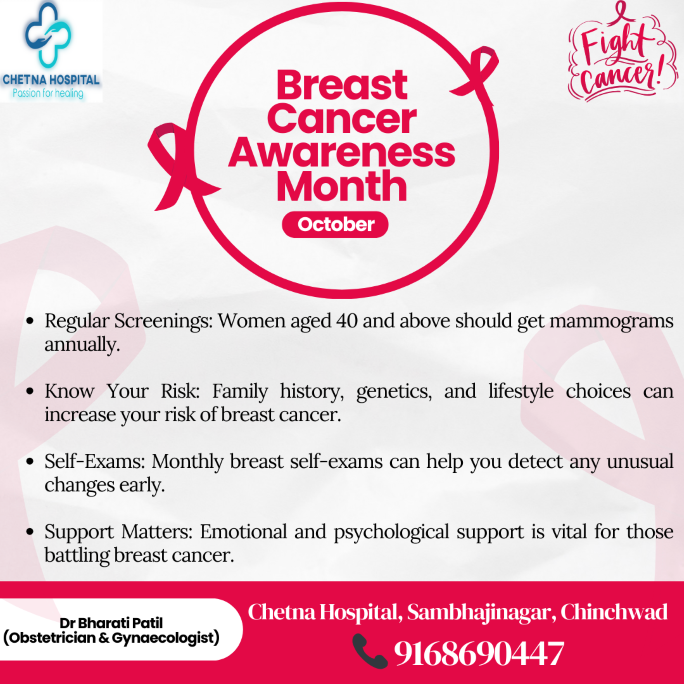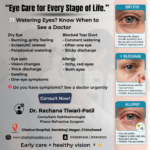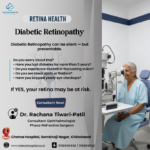Every October, Breast Cancer Awareness Month is observed worldwide to spread awareness about breast cancer, encourage early detection, and support those affected by the disease. Breast cancer is the most common type of cancer diagnosed among women globally, and while significant advancements in treatment have been made, early detection remains the key to saving lives. This month is an opportunity to educate the public, dispel myths, share stories of strength, and emphasize the importance of regular screenings and self-examinations.
Understanding Breast Cancer
Breast cancer begins when cells in the breast grow uncontrollably, forming a tumor. These cells may spread to other parts of the body if left untreated. While both men and women can develop breast cancer, it is far more common in women. The risk increases with age, but breast cancer can occur in younger women as well.
There are several types of breast cancer, the most common being:
- Ductal Carcinoma In Situ (DCIS): A non-invasive cancer where the cells are confined to the ducts in the breast.
- Invasive Ductal Carcinoma (IDC): The most common form of breast cancer that starts in the ducts and then invades surrounding tissue.
- Invasive Lobular Carcinoma (ILC): Begins in the lobules (milk-producing glands) and can spread to other parts of the body.
Other, less common types include triple-negative breast cancer, HER2-positive breast cancer, and inflammatory breast cancer. Each type requires a different approach to treatment, emphasizing the importance of early detection and accurate diagnosis.
Why Breast Cancer Awareness Matters
Breast cancer awareness is not just about knowing the facts; it’s about empowering individuals with the knowledge and resources to take control of their health. While breast cancer survival rates have improved significantly, thanks to early detection and better treatments, the disease still claims hundreds of thousands of lives each year. Many of these deaths are preventable if the cancer is caught in its early stages. This is why awareness campaigns, like those during Breast Cancer Awareness Month, are vital.
Breast cancer can develop without noticeable symptoms in the early stages, which is why screening is so important. Many women avoid screenings because of fear, misconceptions, or lack of access to healthcare. These barriers need to be addressed, and Breast Cancer Awareness Month plays a crucial role in breaking down these obstacles.
The Importance of Early Detection
Early detection significantly improves the chances of successful treatment and survival. There are several methods for early detection, including self-examinations, clinical breast exams, and mammograms.
- Self-Examinations: Women should perform monthly breast self-examinations starting in their 20s. This helps them become familiar with the normal look and feel of their breasts so they can detect any changes. Look for lumps, changes in size or shape, dimpling of the skin, or unusual discharge from the nipples.
- Clinical Breast Exams: Regular check-ups with a healthcare professional are essential. These exams are often included in routine medical visits and can detect abnormalities that may not be noticeable during self-exams.
- Mammograms: A mammogram is an X-ray of the breast and is the most effective tool for detecting breast cancer early, even before a lump can be felt. Women aged 40 and older are typically advised to get mammograms annually or every two years, depending on their risk factors. Women with a family history of breast cancer or other risk factors may need to start earlier.
In addition to these methods, ultrasounds, MRIs, and genetic testing (for mutations in BRCA1 or BRCA2 genes) may be recommended for those at higher risk.
Risk Factors and Prevention
While breast cancer can affect anyone, certain factors increase the likelihood of developing the disease. These include:
- Age: The risk of breast cancer increases as a woman gets older, with most cases diagnosed after the age of 50.
- Family History: A family history of breast or ovarian cancer increases a person’s risk, especially if the cancer was in close relatives, like a mother or sister.
- Genetics: Inherited gene mutations, such as BRCA1 and BRCA2, significantly raise the risk of breast cancer.
- Reproductive History: Women who began menstruating before age 12 or started menopause after age 55 have a higher risk of breast cancer due to longer exposure to estrogen.
- Hormone Replacement Therapy (HRT): Long-term use of hormone therapy for menopause can increase breast cancer risk.
- Lifestyle Factors: Obesity, lack of physical activity, alcohol consumption, and smoking are all linked to a higher risk of breast cancer.
While some risk factors like age and genetics cannot be changed, there are several lifestyle changes that can reduce the risk of developing breast cancer:
- Maintain a healthy weight: Obesity, especially after menopause, increases breast cancer risk.
- Exercise regularly: Staying physically active reduces the risk of breast cancer and improves overall health.
- Limit alcohol: Even small amounts of alcohol can increase the risk of breast cancer, so it’s important to drink in moderation or avoid alcohol altogether.
- Avoid smoking: Smoking is linked to many types of cancer, including breast cancer.
- Breastfeed if possible: Breastfeeding for several months can lower breast cancer risk, especially in women who breastfeed for a year or more.
For those at very high risk, such as women with BRCA mutations, preventive measures like prophylactic mastectomy (removal of healthy breasts to prevent cancer) or medications that lower estrogen levels may be considered.
The Emotional Impact of Breast Cancer
Breast cancer is not just a physical battle; it’s an emotional one as well. The diagnosis, treatment, and recovery process can be overwhelming, not only for the patient but also for their family and friends. Feelings of anxiety, fear, and sadness are common, and many women experience a loss of confidence or a change in body image following treatment, especially if surgery is involved.
This is why support networks play such a crucial role in the healing process. Whether it’s friends, family, or support groups, having people to lean on during this difficult time can provide emotional relief and encouragement. Many hospitals and cancer care centers offer counseling services, both individually and in groups, to help patients cope with their emotions and the challenges they face.
Supporting Breast Cancer Awareness
During Breast Cancer Awareness Month, numerous organizations, hospitals, and advocacy groups come together to raise awareness and funds for breast cancer research. Pink ribbons, which have become the universal symbol for breast cancer awareness, are displayed prominently, and various events such as charity walks, fundraisers, and educational workshops are organized.
There are many ways individuals can show their support for Breast Cancer Awareness Month:
- Spread Awareness: Share information about breast cancer, its symptoms, and the importance of early detection with your friends, family, and community. Social media platforms are great for reaching a large audience.
- Donate: Contribute to organizations that fund breast cancer research or provide support services to patients and survivors.
- Participate in Events: Join local or national events, such as walks or runs, to raise money and awareness for breast cancer.
- Support Survivors: Offer encouragement to breast cancer survivors and those currently battling the disease. Even a simple conversation can make a huge difference.
Conclusion: A Shared Responsibility
Breast Cancer Awareness Month is a reminder of the impact that breast cancer has on millions of lives each year. It’s also a call to action for individuals, families, and communities to take responsibility for their health and the health of those they love. By promoting early detection, supporting research, and offering emotional and financial assistance to those affected, we can work together to reduce the impact of breast cancer on our society.
At Chetna Hospital, we are committed to spreading awareness, providing compassionate care, and offering state-of-the-art treatments to those affected by breast cancer. This October, let’s unite in the fight against breast cancer and work towards a future where no one has to fear this disease. Early detection saves lives—let’s make sure every woman knows it.
For Consultation Contact us on 9168690447
Website – www.chetnahospital.co.in
Address – Chetna Hospital, Sambhajinagar, MIDC, G Block, Near Rotary Club, Chinchwad 411019
.
.
.
#hospital#pune#pcmc#chinchwad#health#healthcare#gynaecologist#femalegynaecologist#gynaecologistappointment#gynac#gynaecologistdoctor#gynaecologisthospital#goodgynaecologist#gynaecologistspecialist













